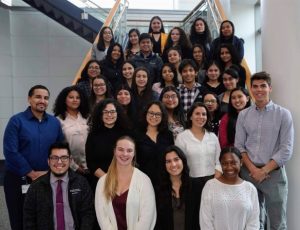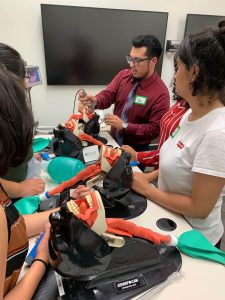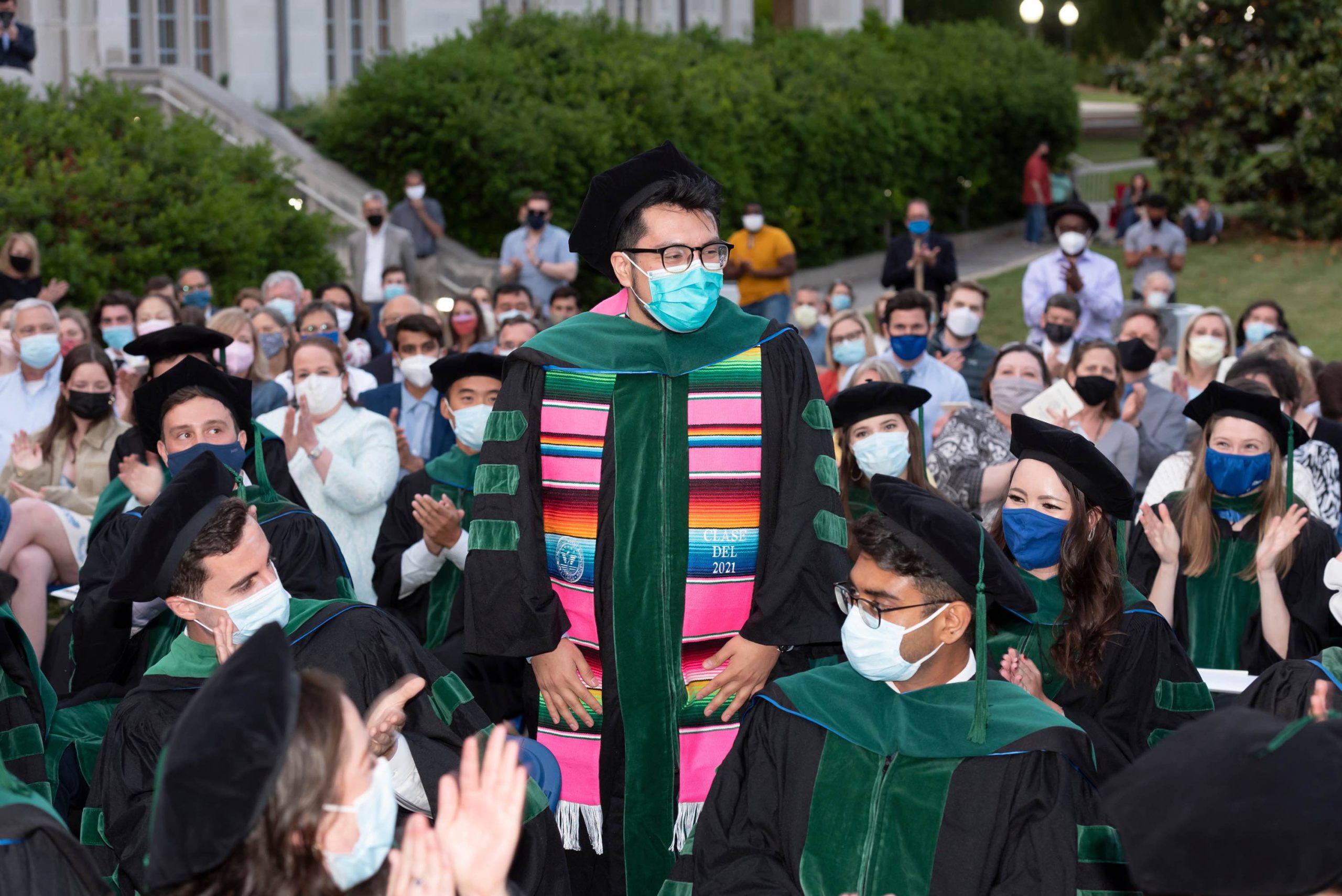
For Alex Villeda, mentorship is more than a resume builder. It’s the conscious choice to care deeply about someone and do what you can to get them where they’re going. It’s also a matter of justice.
Alex is a first-year pediatric resident at Children’s National Hospital in Washington, DC, whose personal ethic is grounded in caring and advocating for children and families. At times, the dissonance between being a physician and an advocate has seemed irreconcilable. But ongoing guidance from mentors with similar passions is showing Alex what’s possible.
When Alex reflects on formative mentorship, he zeros in on his relationship with his friend and mentor, Dr. Tony Fuller. Alex was introduced to Tony by Maureen Cullins, Director of the Duke School of Medicine’s Multicultural Resource Center and recent recipient of the Duke Presidential Award. Having been a mentor to Tony prior, and then coming to know Alex, Ms. Cullins immediately saw similarities between the two’s stories and knew they’d be able to help one another on the journey that was unfolding.
Alex and Tony were both young parents from similar cultural backgrounds, navigating extremely tough personal moments while making their way in medicine. With Tony just a few years older than Alex, having graduated from college and matriculated to med school, he was the near-peer mentor that Alex needed. “He was like a look into the near future,” Alex recalls. The two often laugh about how typical it was for Tony to respond, knowingly, to new obstacles in Alex’s life by saying, “Man, I just went through that.”
The connection with Tony has only deepened over time. “It was so meaningful to find similarity in our struggles,” says Alex. “Struggles that other people hadn’t experienced and might never experience, given our life circumstances. Having somebody show me that it can be done, that there is hope, and that you can pursue all your dreams and fight for what you believe in with passion…It was necessary.”
Alex and Tony both shared the experience of navigating a system while wanting to change it. They saw the ways that people like them were simultaneously needed and disadvantaged in the fields they’d chosen. There were other mentors in Alex’s life, but Alex says Tony was “closer to the fight and the fire”. He knew the delicate balance between spark and restraint, and that timing, when working for change, is everything. That, Alex says, is what made this particular mentorship different.

The relationship continued to grow throughout Alex’s final year of college and into Alex’s gap year, when he and Tony teamed up to co-found Scholar Academy for Latinxs United for Diversity (SALUD). Since its inception, the program has grown into a 12-session curriculum that addresses social determinants of health disparities through a social justice lens while retaining a focus on health technology, science, and college access. “SALUD was a way for us to give back to underrepresented, underrecognized, and underresourced communities,” says Alex. “Our communities.”
SALUD was a collaborative leadership experience from the start and Alex found it rewarding to watch the entire team break out of their comfort zones and grow together as mentors. “We grew in presenting, leading groups, working with community partners, understanding finances, securing sponsors, and most importantly, engaging younger students,” says Alex. “That last part could be tough but was so rewarding.”

A large part of what made SALUD so special was that Alex and the team were working with students who didn’t always receive the focused attention they needed from their usual learning environments. SALUD was a way to offer the care and safety necessary to bring them out of their shells and uncover their potential. Growing the team’s capacity to meet students’ needs meant helping students feel safe and showing them how special they are. “We were asking ourselves, as teammates, ‘How do we talk about sensitive topics? About trauma? How do we create a space in which everyone is confident that we’re looking out for one another?’ It’s not enough to have more people of color in these spaces; they need to belong.”
Having somebody show me that it can be done, that there is hope, and that you can pursue all your dreams and fight for what you believe in with passion…It was necessary.”
That passion for compassion is one of the primary traits Alex looks for in a mentor, perhaps because it’s been such a central part of his own journey. He says that even if a mentor can’t exactly identify with what a mentee is experiencing, they must make it safe for mentees to be their full selves and find a way to support them with genuine care and authenticity.
Alex recalls a discouraging moment when he was applying to med school and hadn’t yet received any interview offers. At the time, Alex was working with College Advising Corps and loved it so much that he’d considered withdrawing his med school applications and abandoning the practice for a profession that felt more advocacy-focused. A candid, vulnerable talk with Ms. Cullins changed his mind. Ms. Cullins reminded Alex of the late Dr. Armstrong and the legacy she’d built as a physician and an advocate. “That was a moment when I realized that I didn’t have to keep these two parts of myself separate. They’re united and intertwined and they influence the kind of person I want to be.”

On graduation day, Alex was presented the Dr. Brenda Armstrong “Living the Dream” Award by Dr. Delbert Wigfall, another impactful mentor. The award was deeply meaningful, as Alex had been inspired by Dr. Armstrong since he first heard her speak years prior at the Summer Biomedical Sciences Institute (SBSI), then known as the Summer Medical and Dental Education Program. Dr. Armstrong had also spent time sharing her story with Alex’s students at City of Medicine Academy, while Alex was working with the Duke College Advising Corps. “To me, Dr. Armstrong was the definition of physician advocacy and her passion was palpable,” says Alex. “Being in her presence had a way of elevating your hopes for yourself and the world,” Alex remembers Dr. Armstrong as a visionary trailblazer who left an indelible mark on her community. Though he never got to experience a formal mentor relationship with her before she passed, Dr. Armstrong’s impact was one that transcended one-to-one connection. Her friends and colleagues—Ms. Cullins, Dr. Wigfall—and mentees like Tony were extensions of her impact, propelling Alex to where he is today. “I am forever indebted to these wonderful people and I pay it back by paying it forward.”
Alex is still finding ways to integrate the two parts of himself—physician and advocate—that have seemed disparate at times. “I just want to care for people in ways that go beyond what we’re able to accomplish at a hospital or clinic,” he shared. “That’s time, energy, and space that’s not part of the curriculum or training in most cases.” He’s in the LAUnCH (Leadership in Advocacy, Under-resourced Communities, and Health Equity) track in his residency, which supports residents in integrating community partnerships and public health concepts as fundamental components of their careers. Once again, he has surrounded himself with passionate peers and leaders who care about health justice. After residency, Alex plans to pursue a fellowship in either pediatric critical care or pediatric emergency medicine because he recognizes how stressful and scary a space that can be for families. But his ultimate goal is to create a life for himself where regardless of clinical practice, he gets to prioritize time and energy in the pursuit of health justice for the communities he holds dear.
“There’s oftentimes this old school of thought that doctors only treat diseases,” says Alex. “But we’re also people and members of society and community. I think those can’t and shouldn’t be separate.”
Connect with Alex on LinkedIn and Twitter.
Click here to submit your own #MentorStory.
